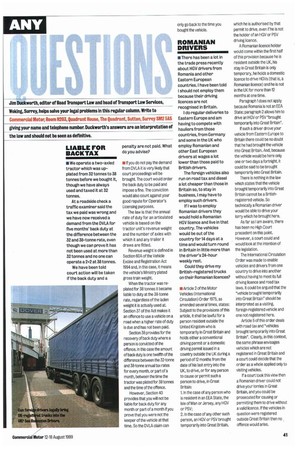ROMANIAN DRIVERS
Page 43

If you've noticed an error in this article please click here to report it so we can fix it.
• There has been a lot in the trade press recently about HGV drivers from Romania and other Eastern European countries. I have been told I should not employ them because their driving licences are not recognised in Britain.
I do regular deliveries to Eastern Europe and am having to compete with hauliers from those countries, from Germany and some In the UK who employ Romanian and other East European drivers at wages a lot lower than those paid to British drivers.
The foreign vehicles also run on road tax and diesel a lot cheaper than those In Britain so, to stay in business, I may have to employ such drivers.
If I was to employ Romanian drivers they would hold a Romanian HGV licence and live in that country. The vehicles would be out of the country for 14 days at a time and would turn round in Britain in little more than the driver's 24-hour weekly rest.
Could they drive my British-registered trucks on their Romanian licences?
• Article 2 of the Motor Vehicles (International Circulation) Order 1975, as amended several times, states: Subject to the provisions of this article, it shall be lawful for a person resident outside the United Kingdom who is temporarily in Great Britain and holds either a conventional driving permit era domestic driving permit issued in a country outside the UK during a period of 12 months from the date of his last entry into the UK, to drive, or for any person to cause or permit such a person to drive, in Great Britain: 1. In the case of any person who is resident in an EEA State, the Isle of Man or Jersey, any HGV or PSV; 2. In the case of any other such person, an HGV or PSV brought temporarily into Great Britain, which he is authorised by that permit to drive, even if he is not the holder of an HGV or PSV driving licence.
A Romanian licence holder would come within the first half of this provision because he is resident outside the UK, his stay in Great Britain is only temporary, he holds a domestic licence to drive HGVs (that is, a Romanian licence) and he is not in the UK for more than 12 months at one time.
Paragraph ldoes not apply because Romania is not an EEA State; paragraph 2 allows him to drive an HGV or PSV "brought temporarily into Great Britain".
If such a driver drove your vehicle from Eastern Europe to Britain there could be no doubt that he had brought the vehicle into Great Britain. And, because the vehicle would be here only one or two days a fortnight, it could be said to be brought temporarily into Great Britain.
There is nothing in the law which states that the vehicle brought temporarily into Great Britain cannot be a Britishregistered vehicle. So technically a Romanian driver would be able to drive your lorry which he brought here, As far as I am aware, there has been no High Court precedent on this point. However, a court could and would look at the intention of the legislation.
The International Circulation Order was made to enable vehicles and drivers from one country to drive into another without having to meet its full driving licence and road tax laws. It could be argued that the 'vehicle brought temporarily into Great Britain" should be interpreted as a visiting, foreign-registered vehicle and one not registered here.
Article 5 of this order deals with road tax and "vehicles brought temporarily into Great Britain". Clearly, in this context, the same phrase envisages vehicles which are not registered in Great Britain and a court could decide that the order as a whole applied only to visiting vehicles.
If a court took this view then a Romanian driver could not drive your lorries in Great Britain, and you could be prosecuted for causing or permitting them to drive without a valid licence. If the vehicles in question were registered outside Great Britain then no offence would arise.








































































































